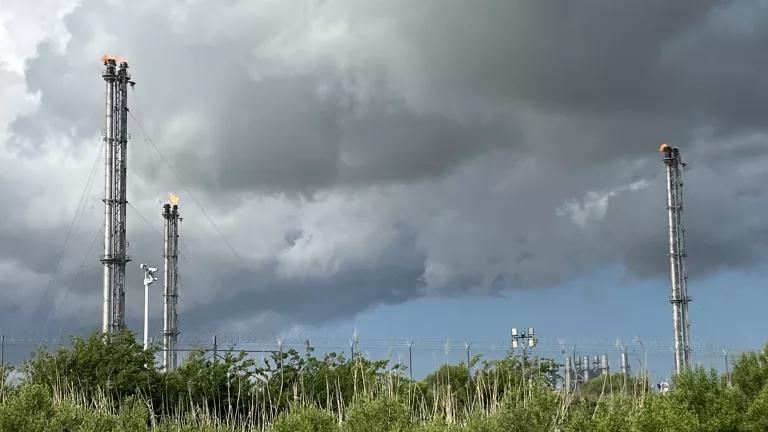General Electric’s Coal Plant Profiteering Needs to End Now
The U.S.-based giant General Electric (GE), wants to carry on quietly with business activities that seriously endanger millions of people and the planet.
Young people have been holding climate strikes around the world for months, demanding that all of us take dramatic and far-reaching action on climate change so they’ll be able to enjoy a livable world, not one ravaged by climate catastrophe. With the global climate strike and U.N. Climate Action Summit approaching fast, the private sector also is being urged to take stronger action to speed a global transition from fossil fuels and toward clean energy.
But one company, the U.S.-based giant General Electric (GE), wants to carry on quietly with business activities that seriously endanger millions of people and the planet. GE is helping to equip and plan more than a dozen new coal-fired power plants around the world, according to new research NRDC released today.
This is important because greenhouse gas pollution from coal plants is one of the largest drivers of climate change. GE’s obsession with maximizing corporate profits—it earned $121.6 billion in revenue in 2018—is leading it down a dangerous and dirty path that puts our health and climate at risk. Furthermore, its quiet drive to build coal plants stands in sharp contrast to its public campaign purporting to be a good environmental citizen. In this ad “Digital Wind Farm: How GE Turbines Power Cities With Meikle Wind” the company boasts that it’s “pioneering new technologies to harness renewable energy in places previously thought impossible.”
If GE can do the impossible, it certainly can also do the possible. That means GE should end its hypocrisy now and hasten an end to developing coal power plants overseas, in countries already feeling impacts from dangerous climate change. General Electric, the company co-founded in 1892 by inventor extraordinaire Thomas Edison, should be better than this. (Although, it's pretty clear GE is not a model citizen in the U.S. either: Edison’s great-grandsons recently pushed back against the U.S. government's attempt to roll back efficiency improvements. Whereas GE supports these nonsensical rollbacks which would increase US emissions, since it would let them keep selling extremely inefficient incandescent and halogen light bulbs.)
Coal projects like the ones GE is proposing could not get built in the United States—where coal plants are shutting down. Without a domestic market for its coal products, GE is peddling its outdated technology overseas. The construction of these GE-equipped coal plants will lock in decades of fossil fuel dependence and associated health and climate hazards in areas already highly vulnerable to climate change.
Four particularly alarming projects involving GE are currently under consideration by developers, regulators, and financiers:
- the first-ever coal plant in East Africa, to be located next to a UNESCO World Heritage site in Lamu, Kenya
- a coal plant in Kosovo from which the World Bank withdrew its financing after determining that renewable energy would be more affordable
- a coal plant in Bosnia and Herzegovina that does not comply with European Union finance standards and violates the union’s pollution control rules
- a coal plant in Vietnam that has been delayed following the imposition of U.S. sanctions on a Russian project contractor
GE’s statement on climate change claims that “GE supports the science and goals expressed in the Paris Agreement”—which include the need to immediately phase down global greenhouse emissions. Yet the same document says building new coal generation is a good thing. Talk about a blatantly duplicitous PR statement.
GE’s excuse is that their coal plants replace dirtier ones, but in reality retiring coal plants and moving to zero-carbon power sources would be the rational way to align with the Paris Agreement. But then that wouldn’t let GE profit from selling its outdated coal products. Despite GE’s claim to be in line with the Paris Agreement, it’s still pushing for the construction of coal plants in Kenya and Mozambique. GE’s excuse about replacing old coal plants is blatantly false in these cases because there are currently no coal plants in East Africa to replace. GE’s not replacing coal plants; what GE would be replacing is the opportunity for local residents to breathe clean air, replacing it with dangerous pollutants. Disingenuous would be an understated way to describe GE’s power sector strategy.
GE certainly included caveats to its “support” for the Paris Agreement by saying it would support policies that “reflect national and local circumstances”—what that actually means it that since rules restricting coal pollution in the US to protect the health of Americans are strong, so GE is just going to sell these products Americans do not want in markets that simply don’t have sufficient (if any) pollution controls. That’s exploitation of people and countries.
So, for instance, who cares if Kenya has weaker air pollution regulations or enforcement against emissions from coal plants (since the country doesn’t have any coal-fired power plants). Why shouldn’t GE sell a highly-polluting coal plant there? It certainly fits with the air pollution rules there, right? (As a comparison: the plant would be allowed to emit five to ten times as much pollution as new coal-fired power plants in China or the EU). And so what if coal plants in Vietnam are allowed to emit ten times as much air pollution as coal plants in other countries in Asia, such as Japan, for example? GE is still willing to supply a coal plant there, even after the project was delayed due to U.S. sanctions imposed on one of the Russian contractors.
Well, unfortunately, just because GE sidesteps pollution controls by going to places where pollution standards are weaker, does not mean that the human ability to deal with coal pollution is miraculously higher in those places. Notably, the coal power plant project GE is considering in Kenya is projected to cause 1600 premature deaths over its lifetime if the project moves forward, according to air quality analysts. It’s also why local groups have publicly opposed the project, and why institutional investors in GE have called on GE to reject any involvement in the coal project and transition out of fossil fuels and focus on clean technologies.
GE’s involvement in coal projects will lock in carbon emissions, local pollution, and economic harms across the globe, for decades, at a time when clean, affordable energy solutions abound and costs to build and install these systems are plummeting. GE should end its support for coal power plants, and instead focus on building up a workforce for zero-carbon technologies in alignment with the Paris goals.
It should begin by canceling involvement in the proposed projects in Kenya, Kosovo, Bosnia, and Vietnam. This transition will not only benefit the climate but also help avoid additional financial and reputational losses that could be even worse than what GE has already incurred by betting big—and wrong—on fossil fuels.
When world leaders, major companies, and activists from around the world gather in New York for the Climate Summit in September, GE should put forward a new plan for leading a decarbonized future, not peddle outdated technology to countries that deserve better, and truly cleaner, solutions. What’s holding GE back?
Here is the link to the full report: General Electric's Coal Plant Profiteering



